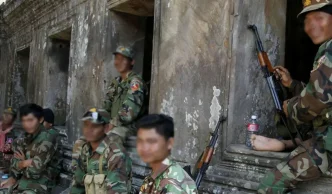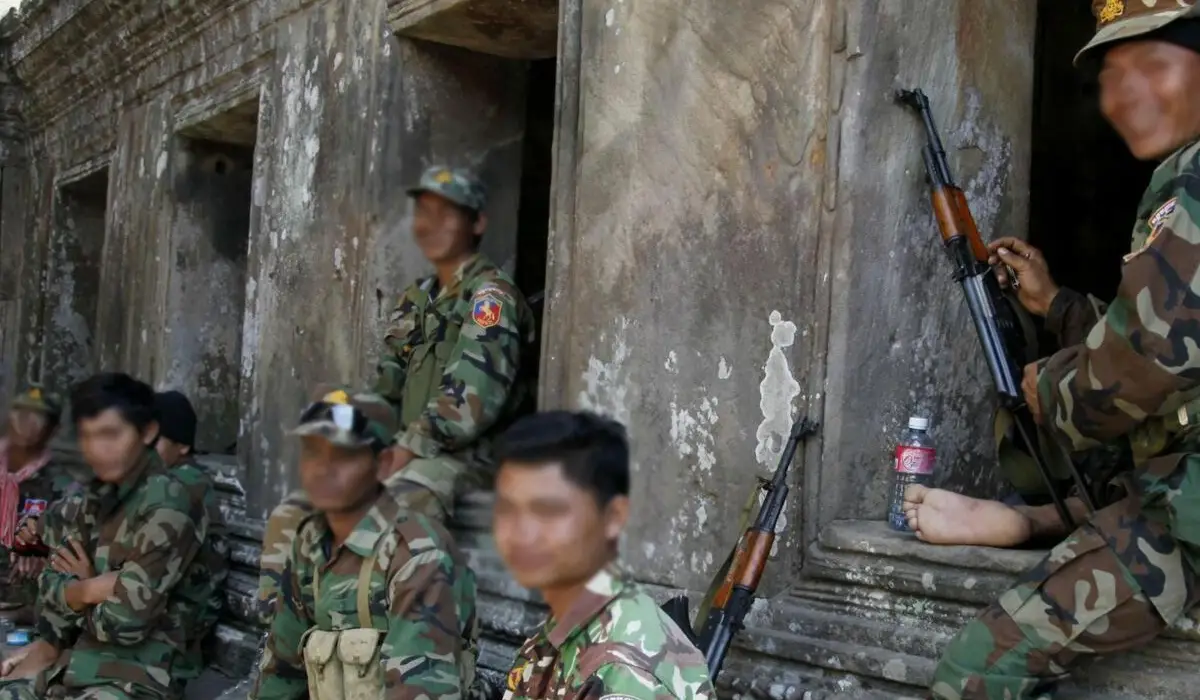A seemingly minor scheduling discrepancy at a key border checkpoint between Cambodia and Thailand has spiraled into a heated dispute, exposing underlying tensions between the two nations. On the first day of new operating hours, Cambodia opened the checkpoint an hour later than Thailand, leading to significant delays, frustration among cross-border travelers, and sharp exchanges between officials. The incident, which unfolded at a busy crossing point, has reignited concerns about coordination and trust in a region with a history of territorial and diplomatic friction.
Chaos on the First Day
The border checkpoint, a critical conduit for trade and travel between the two Southeast Asian neighbors, became a flashpoint when Cambodia implemented new operating hours without fully aligning with Thailand’s schedule. According to reports, Thai authorities opened their side of the checkpoint at the agreed-upon time, only to find Cambodia’s side delayed by an hour. The result was a bottleneck of vehicles, frustrated commuters, and mounting tensions as the day progressed.
Travelers caught in the chaos expressed their dismay. “We were stuck for hours with no explanation” said a Thai truck driver who regularly transports goods across the border. “This kind of thing shouldn’t happen if both sides are serious about working together.”
Local businesses, which rely heavily on the smooth flow of goods and people, were also impacted. A Cambodian market vendor near the checkpoint noted the immediate financial toll. “I lost half a day’s earnings waiting for supplies that never arrived” she said. The economic ripple effects of such disruptions are a stark reminder of how interconnected the border regions are—and how quickly misunderstandings can escalate.
Official Reactions and Accusations
Both governments have since issued statements, with each side pointing fingers at the other for the lack of coordination. Thai officials claimed they had communicated the new hours well in advance and were caught off guard by Cambodia’s delayed opening. A spokesperson for Thailand’s border authority stated, “We expected a seamless transition based on prior agreements” adding that the incident raised questions about reliability.
Cambodian authorities, meanwhile, defended their actions, citing internal logistical challenges and the need for additional time to train staff on the updated protocols. “This was not intentional, and we are working to resolve any misunderstandings” said a representative from Cambodia’s Ministry of Interior. However, some Thai commentators have suggested that the delay may reflect deeper reluctance on Cambodia’s part to fully cooperate on border issues—a claim that remains unverified and speculative at this stage.
The incident comes against a backdrop of historical friction between the two nations, including disputes over territory and border demarcations. While both sides have made efforts in recent years to improve relations through dialogue and joint economic initiatives, incidents like this highlight how fragile trust can be in the region.
Historical Context of Border Disputes
The Cambodia-Thailand border has long been a source of contention, with disputes dating back decades. One of the most prominent conflicts centers on the Preah Vihear Temple, a UNESCO World Heritage site located in a disputed area. Clashes over the temple’s ownership have led to military confrontations in the past, most notably between 2008 and 2011, when skirmishes resulted in casualties on both sides. Although a 2013 International Court of Justice ruling awarded the temple to Cambodia, tensions over surrounding areas persist.
Beyond territorial disagreements, the border region is a hub for cross-border trade, labor migration, and tourism, making coordination between the two nations essential. Checkpoints like the one at the center of this latest dispute handle millions of dollars in goods annually, alongside thousands of daily travelers. Any disruption, no matter how small, can have outsized economic and social consequences.
Analysts suggest that the checkpoint delay, while minor in isolation, could be symptomatic of broader communication breakdowns. “This isn’t just about an hour’s delay” said Dr. Sovanarith Keo, a regional politics expert based in Phnom Penh. “It’s about trust, or the lack thereof, between two neighbors who have a complicated history.”
Economic and Social Impacts
The immediate economic fallout from the checkpoint delay was felt most acutely by those who depend on cross-border movement for their livelihoods. Truck drivers transporting perishable goods reported losses due to spoilage, while small-scale traders on both sides faced delays in receiving inventory. The cost of such disruptions can be significant, with some estimates suggesting that a single day of delays at major checkpoints can result in losses of up to 3 million Thai Baht (US$84,000) in trade value.
Socially, the incident has stoked frustration among border communities, many of whom already feel neglected by central authorities. In interviews with local media, residents on both sides expressed a desire for better communication and accountability from their governments. “We just want to live and work in peace, without these constant problems” said a Cambodian farmer whose family frequently crosses the border for trade.
The delay also raises questions about the feasibility of regional integration initiatives, such as the ASEAN Economic Community, which aims to facilitate the free movement of goods and people across Southeast Asia. If neighboring countries struggle to synchronize something as basic as checkpoint hours, broader goals of economic unity could face significant hurdles.
Diplomatic Efforts and Potential Resolutions
In the wake of the incident, both Cambodian and Thai officials have signaled a willingness to address the issue through dialogue. A joint meeting between border authorities is reportedly scheduled for later this week, with the aim of harmonizing schedules and preventing future disruptions. “We are committed to finding a solution that benefits both sides” said a Thai diplomat involved in the talks.
However, some observers remain skeptical about the likelihood of a quick resolution. Given the history of mistrust, even small disagreements can become politicized, with domestic audiences on both sides pressuring their governments to take a hard line. If the checkpoint issue is framed as a matter of national pride rather than a logistical hiccup, it could complicate diplomatic efforts.
International mediators, including ASEAN representatives, may also play a role in de-escalating tensions. The regional bloc has previously facilitated dialogue between member states during border disputes, though its influence is often limited by the principle of non-interference in domestic affairs. Still, a neutral third party could help bridge the communication gap that led to this latest flare-up.
Broader Implications for Regional Stability
While the checkpoint delay is unlikely to lead to outright conflict, it serves as a reminder of the fragility of regional stability in Southeast Asia. With multiple countries sharing borders that are often poorly demarcated or historically contested, the potential for misunderstandings is high. Add to this the pressures of economic competition, migration flows, and differing political systems, and the region becomes a tinderbox for disputes.
For Cambodia and Thailand, the incident underscores the need for stronger mechanisms to manage border interactions. Joint training programs for border staff, real-time communication channels between officials, and regular bilateral reviews of operating protocols could help prevent similar issues in the future. Without such measures, even minor missteps risk fueling nationalist sentiments or undermining economic cooperation.
Public sentiment, as gauged through social media platforms like X, reflects a mix of frustration and calls for pragmatism. Many users from both countries have urged their governments to prioritize practical solutions over political posturing, with one Thai commenter noting, “We’re neighbors—let’s act like it.”
Looking Ahead
As Cambodia and Thailand work to resolve the checkpoint dispute, the incident serves as a microcosm of the broader challenges facing border regions across Southeast Asia. While the immediate issue may be resolved through dialogue, the underlying lack of trust and coordination remains a significant obstacle. For border communities, the hope is that both governments will prioritize their needs over political brinkmanship, ensuring that a one-hour delay does not become a lasting source of division.
















